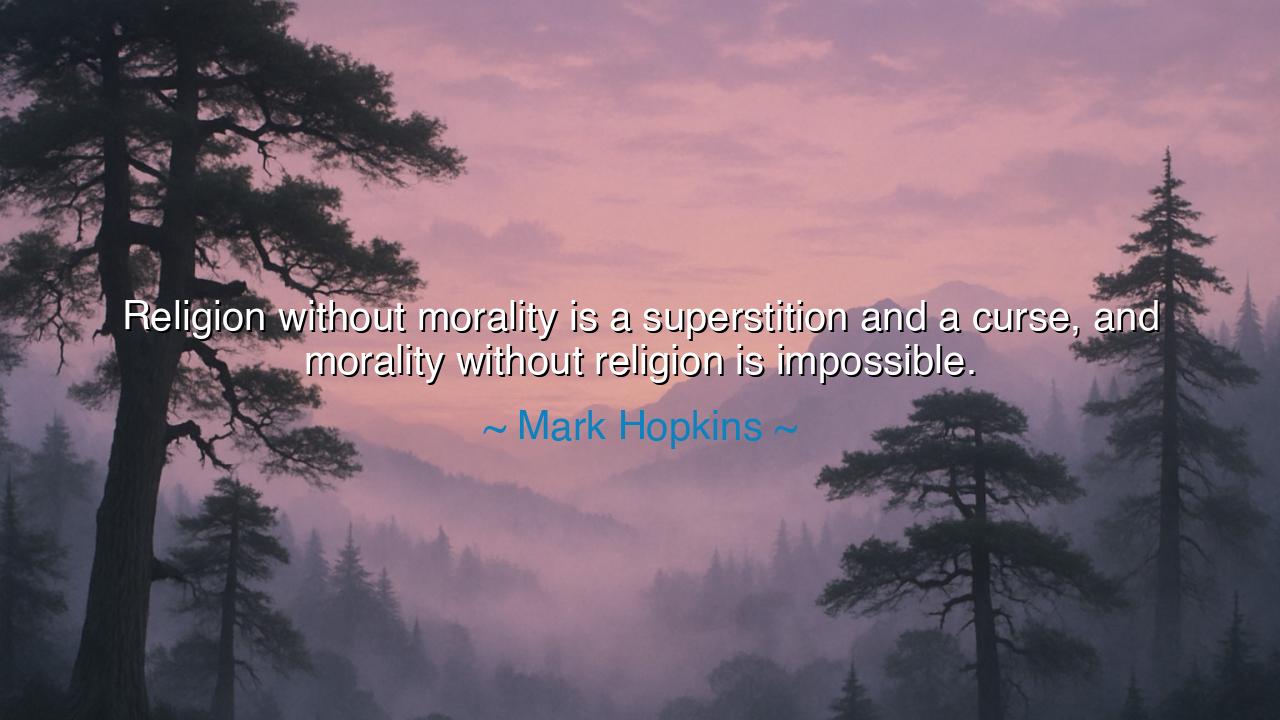
Religion without morality is a superstition and a curse, and
Religion without morality is a superstition and a curse, and morality without religion is impossible.






Hear, O seekers of wisdom, the words of Mark Hopkins, a teacher of men and a voice of the nineteenth century: “Religion without morality is a superstition and a curse, and morality without religion is impossible.” In this utterance lies a truth both stern and luminous, for it binds together the two pillars upon which human life must rest: religion and morality. Hopkins warns us that when one stands without the other, it falters, distorts, and brings ruin rather than blessing.
Consider first the danger of religion without morality. What is it but empty ritual, the clamor of lips that praise while hands commit injustice? Such religion becomes superstition, a hollow form that enslaves rather than frees. Worse, it becomes a curse, for when cloaked in sacred names, cruelty gains false legitimacy. History bears witness: in the days of the Spanish Inquisition, men tortured in the name of Christ, burning bodies as offerings to what they called faith. But this was no true religion; it was faith stripped of morality, and thus it became darkness, not light.
Now consider the opposite: morality without religion. Hopkins declares it impossible, not because men cannot act kindly without belief, but because morality requires a foundation beyond convenience. If right and wrong are only human inventions, then in the hour of temptation, they are easily cast aside. But when morality is seen as bound to the eternal, as flowing from the divine order of the universe, it gains strength beyond self-interest. Thus religion, at its best, gives morality its root, its depth, its eternal anchor. Without such grounding, morality may fade like sandcastles before the tide.
Reflect upon the life of Mahatma Gandhi. Though he lived in a time of oppression and injustice, his vision of morality was inseparable from his religion. His satyagraha, the force of truth and nonviolence, was not a mere political tactic but a spiritual calling, rooted in his understanding of God and the sacredness of all beings. His moral courage arose not from convenience, but from faith. Had he relied only on human calculation, he might have chosen violence, but his religion and morality together gave him the power to resist with peace, and in doing so, to change a nation.
Yet Hopkins’ teaching also serves as a mirror for each of us. How often do we see religion without morality, when men pray loudly but exploit the poor in silence? How often do we see morality without religion, when people claim goodness but discard the deeper reverence for life and the eternal? Both paths are broken. One leads to hypocrisy and cruelty, the other to shallowness and collapse. Only when the two stand together—faith and righteousness, devotion and justice—does the human spirit find balance.
The lesson is plain: let your religion be not words alone, but deeds of compassion. Let it be tested not by the rituals you perform, but by the justice you uphold, the mercy you extend, the truth you embody. And let your morality be more than convenience or fashion; root it in reverence, in something greater than yourself, so that when storms come, it will endure.
So I say to you, O children of tomorrow: marry your faith to virtue, and your virtue to faith. Do not let either stand alone, lest they wither into superstition or vanity. Instead, let them grow together like twin roots of a mighty tree, drawing strength from the eternal, bearing fruit for the world. In this union lies the path to a life both noble and divine, where religion is light, morality is strength, and together they become the foundation of a just and holy existence.






AAdministratorAdministrator
Welcome, honored guests. Please leave a comment, we will respond soon